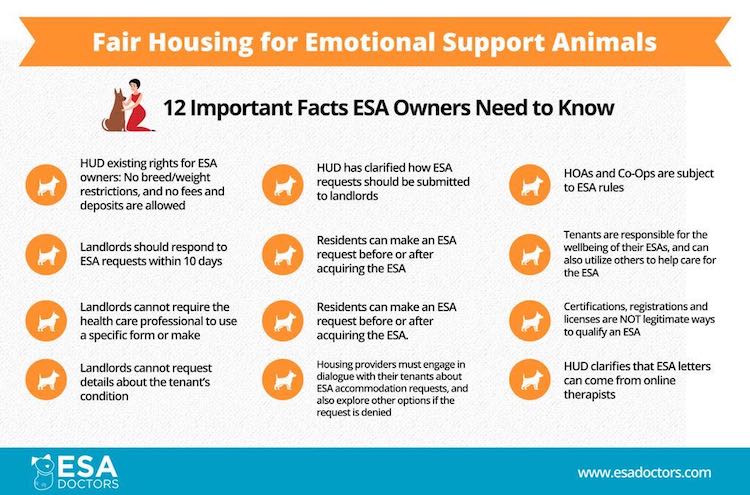According to the Fair Housing Act, an emotional support animal (ESA) can reside with its owner in residential housing, even where pets are not typically allowed. As long as the owner has a valid ESA letter from a licensed healthcare professional, an ESA is not considered a pet. Instead, the ESA is a necessary part of a person’s mental healthcare. If an ESA owner faces discrimination from their landlord and the situation can’t be resolved, it’s possible to file a complaint with the Department of Housing and Urban Development (HUD). This article will explain why and how a complaint could resolve these issues.
What Does HUD Count as an Emotional Support Animal?
An emotional support animal is more than a pet. An ESA helps treat or alleviate a person’s emotional or mental disability by offering warmth, comfort, and companionship. Although emotional support animals are often cats or dogs, they can also be other animals, such as rabbits, fish, hamsters, or iguanas. No matter what animal serves as an emotional support animal, an ESA letter is necessary to ensure it qualifies under federal housing laws. Registering your ESA through an ESA registry does not count as legitimate ESA documentation.
HUD specifically states that “An assistance animal is an animal that works, provides assistance, or performs tasks for the benefit of a person with a disability, or that provides emotional support that alleviates one or more identified effects of a person’s disability. An assistance animal is not a pet.”
If you are ready to see if you qualify for an ESA letter and request reasonable accommodation for your Emotional Support Animal, we would be happy to assist you.
What is an Emotional Support Animal Letter and How do I Get One?
An ESA letter designates an animal as a vital part of a person’s coping plan for their emotional or mental disorder. For example, an individual receiving treatment for depression may benefit from an ESA as the animal’s presence can help them through their dark times.
A licensed healthcare professional may decide to add an ESA into the person’s mental health plan formally. A legitimate ESA letter, signed by a licensed healthcare professional, confirms that an ESA is needed for a person’s mental health disorder. This letter allows an ESA to live with their owner in housing with a no-pets policy under applicable housing laws.
You can get an ESA letter from your primary care physician, psychologist, or other mental health professional. You can also opt to get your ESA letter online from a reputable source that connects you with a licensed mental health professional in your state.
How the Fair Housing Act Applies to ESAs
The Fair Housing Act protects individuals and their ESA’s in various ways. Most importantly, because an ESA is not a pet, an owner is not subject to regular pet deposits or ancillary pet fees. An ESA can reside with their owner in housing where pets are not usually allowed. The landlord cannot enact any breed or weight limitation for an ESA, as long as the animal does not require any unreasonable modifications the to property. However, if damages occur, the landlord is allowed to charge the tenant for them.
As an emotional support animal is not considered a pet, an ESA owner is not subject to regular pet deposits or ancillary pet fees.
ESA Doctors, est. 2015
When Can a Landlord Refuse an Emotional Support Animal?
Occasionally a landlord may turn away an ESA owner without breaking federal law. According to the Fair Housing Act, the landlord or housing provider must demonstrate one of the following:
- The ESA would pose an undue financial or administrative burden.
- The ESA would fundamentally change the nature of the housing.
- The ESA would be a direct threat to the health and safety of others despite other reasonable accommodations.
- The ESA would cause significant property damage despite other reasonable accommodations.
In short, owners of a legitimate ESA should be reasonably accommodated in “no-pets” housing, without pet fees or discrimination, unless the landlord can prove they have a valid exemption.

Filing a Complaint with HUD for your ESA
In rare cases, landlords or housing providers may refuse to follow the Fair Housing Act and deny an ESA owner the right to housing. For example, they may insist on including a pet fee or charge an increase in the security deposit because of the animal. In these instances, ESA owners have the right to file a complaint. HUD has filed charges against many landlords for failing to fulfill their Fair Housing obligations when it comes to emotional support animals.
A complaint with HUD should only be a last resort option if attempts to reach a settlement with the landlord have failed. If you think you’ve been denied reasonable accommodations regarding your ESA then you may want to file a complaint with HUD through the following methods:
- File a complaint online in either English or Spanish.
- Download a form, complete it, and attach the form electronically to your email to your local HUD office on the list.
- Call a specialist at FHEO at 1-800-669-9777 or 1-800-877-8339. You may also contact the number located in your regional area.
- If you prefer sending a hardcopy of your complaint form through the mail, send it to the address listed for your regional area.
What to Know When You File a Complaint
Though you may be tempted to wait to file a complaint, it’s often best to act as soon as possible. Make sure to share as much information as possible, including the following:
- Your full name and current address
- The name and current address of the landlord or housing provider your complaint is against
- The address or an identifying name of the housing or program involved
- A summary of the events which you believe violated your rights
- The date the alleged violation occurred
Despite federal laws that protect individuals with ESAs, some housing providers may feel they have the right to retaliate against you for filing a complaint. Know that it’s illegal for a landlord or housing provider to retaliate against someone who testifies, assists, or files an actual complaint. As long as you have a valid ESA letter, rest assured that you and your ESA are protected by federal law for you to enjoy a long and happy life.









Leave a Comment